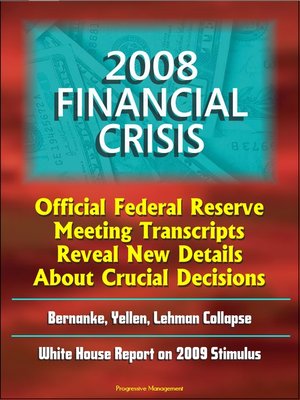2008 Financial Crisis
ebook ∣ Official Federal Reserve Meeting Transcripts Reveal New Details About Crucial Decisions, Bernanke, Yellen, Lehman Collapse, White House Report on 2009 Stimulus
By Randall Schuler

Sign up to save your library
With an OverDrive account, you can save your favorite libraries for at-a-glance information about availability. Find out more about OverDrive accounts.
Find this title in Libby, the library reading app by OverDrive.



Search for a digital library with this title
Title found at these libraries:
| Library Name | Distance |
|---|---|
| Loading... |
This ebook presents the complete set of 2008 financial crisis meeting transcripts released by the Federal Reserve System in February 2014. Widely analyzed by the news media, these important, previously secret transcripts reveal vital new information about the thought process of Chairman Ben Bernanke and his fellow board members as they struggled to control the unraveling of the American financial system. In addition to the nearly 1500 pages of flowing-text transcripts, this ebook compilation includes a new report from the Obama Administration assessing the economic impact of the American Recovery and Reinvestment Act (ARRA) of 2009 (commonly known as the Obama stimulus plan) on the nation's economic recovery.
The ARRA report states: President Obama took office in the middle of the worst economic crisis since the Great Depression. In the previous year private employers shed 3.8 million jobs. Trillions of dollars of household wealth had been wiped out, and the economy's total output, as measured by real gross domestic product (GDP), was in the midst of its most severe downturn of the postwar era. In the face of this crisis, the President took immediate, bold, and effective action. Five years ago, on February 17, 2009, less than a month into his first term, President Obama signed into law the American Recovery and Reinvestment Act of 2009, also known as the Recovery Act, or ARRA. In the four years following the Recovery Act, the President built on this initial step, signing into law over a dozen fiscal measures aiming to speed job creation, including extending Emergency Unemployment Compensation, measures for teacher jobs, aid to states for Medicaid, a temporary 2 percent payroll tax cut for 160 million working Americans, an even greater allowance for businesses to write off the cost of investments when computing their tax liability (that is, "expensing"), the cash-for-clunkers program, an expanded homebuyer tax credit, additional business tax incentives and small business tax cuts, the HIRE Act tax credit, and incentives to hire veterans. Thanks in significant part to the actions of President Obama, the economic picture today is much brighter. GDP per capita started expanding in the third quarter of 2009 and reached its pre-crisis level in nearly four years, considerably faster than the historical record suggests is the typical pace of recovery following a systemic financial crisis. Since 2010, the U.S. economy has also consistently added over 2 million private-sector jobs a year, bringing the overall unemployment rate down to its lowest level since October 2008. The broad-based growth in jobs across sectors has withstood significant headwinds, including more recent fiscal contraction at all levels of government. As part of the accountability and transparency provisions included in the American Recovery and Reinvestment Act of 2009 (ARRA), the Council of Economic Advisers (CEA) was charged with providing to Congress quarterly reports on the effects of the Recovery Act on overall economic activity, and on employment in particular. In this final report, we provide an assessment of the effects of the Act through the fourth quarter of 2013 as well as an assessment of subsequent jobs measures.
Contents: The Economic Impact of the American Recovery and Reinvestment Act * January 9, 2008 Conference Call of the Federal Open Market Committee * January 21, 2008 Conference Call of the Federal Open Market Committee * January 29-30, 2008 Meeting of the Federal Open Market Committee * March 10, 2008 Conference Call of the Federal Open Market Committee * March 18, 2008 Meeting of the Federal Open Market Committee * April 29-30, 2008 Meeting of the Federal Open Market Committee * June...







